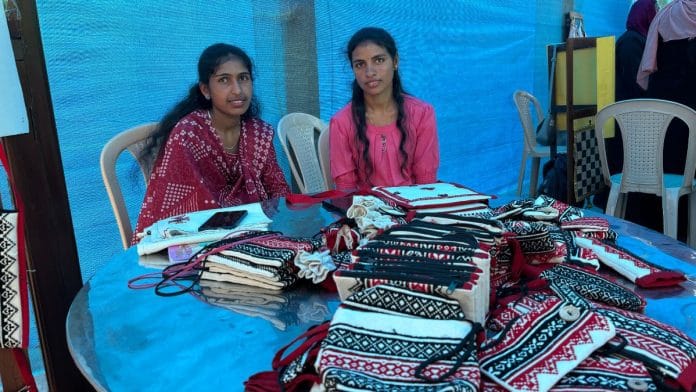Puducherry: A new museum in Auroville about internet empowering Indians has some unlikely artefacts – a brick-sized mobile phone, vintage TV-sized computer monitors and textiles and mats.
It is at the Barkat House warehouse of non-profit Digital Empowerment Foundation’s Museum of Digital Society where the development of communities and societies is being showcased through digital empowerment.
Visitors are first presented with a peek at obsolete digital gadgets before being introduced to women in burqas displaying the traditional, globally renowned Pattamadai Korai mat, crafted from Korai grass. This puzzled the museum’s visitors.
Fathima, 45, as she laid out the mat adorned with an image of MK Gandhi, explained that it’s solely due to digital connect that they’ve been able to double their income selling the mats. Earlier, they had to rely on traditional sales methods.
“Just a year back, when we were barely managing to survive with our traditional mat weaving, DEF came to our aid and introduced us to the concept of selling our mats online. It was our first encounter with the idea of digital sales, realising we could market our mats even from thousands of miles away from our customers,” recounted Fathima, whose family has been engaged in weaving and selling Korai mats for five generations.
Empowering rural communities
DEF, as a part of its community service, held training sessions at Fathima’s native Tirunelveli district in Tamil Nadu to help mat makers market and sell products online. They also guided them on how to make mats that appeal to younger generations.
Fathima, accompanied by her mother Ramadan Deen Beevi, a fifth-generation weaver, mentioned that they have also embraced contemporary trends since venturing into the digital realm.
Fathima, who used to earn between Rs 10,000 and Rs 15,000 a month, now makes a minimum of Rs 30,000 by selling her Korai mats online.
Established in 2002 to empower people through digital literacy and digital tools, DEF has a presence in about 250 districts across 28 states and Union Territories. So far, it has equipped at least 2,177 rural women with the essential knowledge and tech tools required to enhance their entrepreneurial skills. The organisation is also involved in a dozen other initiatives aimed at empowering and educating the rural communities on digital matters.
“After being a columnist for years, only when I wrote a book titled ‘The Internet Economy of India’ in 2001, I realised the harsh reality of the digital divide. Then, the internet was not a medium of communication for over 99 per cent of more than 100 crore Indians,” said Osama Manzar, Founder, DEF.
Idhaya and Suganya Sin, two 25-year-old women belonging to the Toda tribe, were the first from their family to step out of Kotagiri town in the Nilgiris district to sell their traditional embroidery clothes.
“We used to do embroidery at our house, and our husbands used to take them out to sell in the marketplace in the Nilgiris. Since it is a tourism area, we were largely dependent on the local crowd to sell our traditional clothes,” shared Idhaya, who holds a bachelor’s degree in economics and is married to a driver.
Now, a few months after DEF trained the Toda community, the women are able to promote and sell their goods online.
“We never imagined we would have the opportunity to leave our village to sell our clothes by ourselves. Most of the time, our men would sell them at reduced prices just to get the initial investment in the fabric and embroidery. Sometimes, they sold them so cheaply that it wouldn’t even cover the loan we took out to buy the materials,” Idhaya added.
However, the women haven’t been able to make money yet. They get likes and shares on social media, but no sales.
“Maybe it might take time. We don’t know how it works. We did whatever is being taught to us by the DEF,” said Suganya.
Though they were sceptical about the sale of Toda embroidery products online, the women said that the training by DEF has opened other avenues for them.
Also read: Indian art abroad struggles to come home—tax trouble, red tape, and endless wait at customs
Growing business
Arumugam, a 62-year-old third-generation handloom weaver from Salem district, also exhibited his work at the museum. He has taught weaving to many, including his student Meena who makes stoles for the young buyers.
After the training, Meena and Arumugam used online resources to not only sell their products, but also showcase their traditional handloom silks and get support from various institutions and banks.
“Earlier, whether it was to buy cotton or maintain our handlooms, we were largely dependent on the local money lenders. But, thanks to DEF for introducing us to different institutes and banks via online, who helped us grow our business by supporting us,” Meena said.
Arumugam, who had been selling his traditional silks to wholesalers, now has his own handloom silk showroom in Salem, which is supported by HSBC bank and sponsored by the Entrepreneurship Development Institute of India.
As museum visitors engaged with Meena, Suganya, and Idhaya, Fathima arranged her traditional Korai mats.
She takes pride in modernising the traditional korai mats by embroidering them with human figures. “Just in the place of Gandhi, we can embroider anybody’s face and I am among the first to make this attempt in the Korai mats,” Fathima said.
She also said that her work has made people treat her equally.
“More than pride, I find peace in this work because people here treat me no differently,” Fathima said, adding that even members of the Brahmin community are comfortable buying her mats for their weddings.
(Edited by Aamaan Alam Khan)






